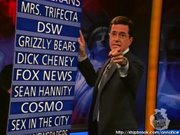Wednesday, August 01, 2007
Secrets & Lies
The Bush administration's chief intelligence official said yesterday that President Bush authorized a series of secret surveillance activities under a single executive order in late 2001. The disclosure makes clear that a controversial National Security Agency program was part of a much broader operation than the president previously described.
The disclosure by Mike McConnell, the director of national intelligence, appears to be the first time that the administration has publicly acknowledged that Bush's order included undisclosed activities beyond the warrantless surveillance of e-mails and phone calls that Bush confirmed in December 2005.
In a letter to Sen. Arlen Specter (R-Pa.), McConnell wrote that the executive order following the Sept. 11, 2001, attacks included "a number of . . . intelligence activities" and that a name routinely used by the administration -- the Terrorist Surveillance Program -- applied only to "one particular aspect of these activities, and nothing more."
Where exactly is the congressional and judicial oversight on these programs? The reason we have checks and balances is that having Alberto Gonzales be the person to decide if something should be legal or not is not a very good way of running a government.
The sixth circuit recently threw out a lawsuit by people who had reasonable suspicion (but no proof) that they were being spied upon by the NSA program. The court's reasoning was that until you had cause or grounds to sue, you had no right to be in court.
This is the danger of an unchecked executive. They could be doing terrible, ineffective, unconstitutional actions. Nobody knows. The people who lose their privacy rights have no way of knowing they were spied upon, so there is no redress in court.
To put a wild example on this, what if the President signed a secret order that one out of every 20 redheaded people must be killed, and it should be made to look like an accident or natural causes. A family of redheads might think that somebody in their family was murdered, but would have no proof, and no standing in court to challenge the order.
That is where oversight is critical. Congress can say, "Hey. I like Juliane Moore. You can kill Carrot Top, but that's as far as we will go with this program". Instead, six years after the fact, congress is informed that the administration engaged in some secretive activities that may be constitutionally suspect, and congress still isn't allowed to know about the programs.
Does anybody trust Alberto and Harriet being the sole checks on Dick Cheney's wildest dreams of executive authority to disregard the constitution?
Posted by
trifecta
at
8:30 AM
![]()
Labels: alberto gonzales, nsa, wiretapping
Subscribe to:
Comment Feed (RSS)



|